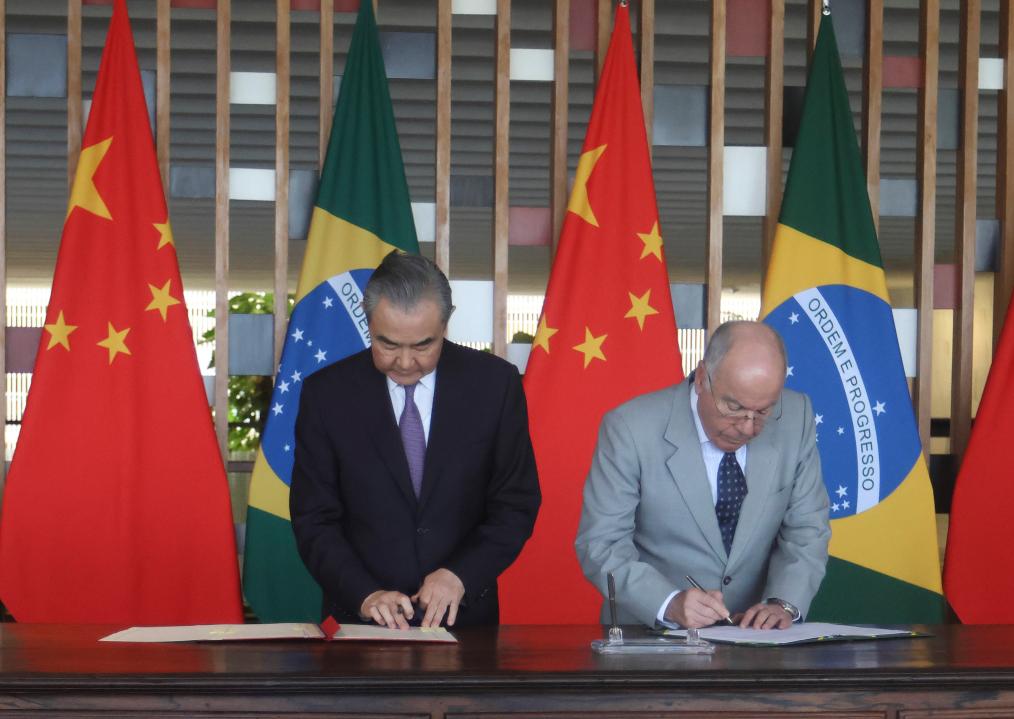The Next ‘Golden 50 Years’

Based on deepening trade and economic ties, the comprehensive strategic partnership between China and Brazil is also growing closer.
At the Fourth China-Brazil Foreign Ministerial-Level Comprehensive Strategic Dialogue, co-chaired by Chinese Foreign Minister Wang Yi and his Brazilian counterpart Mauro Vieira on January 19, an agreement was signed on mutual visa facilitation between the two countries to further expand personnel exchanges.
Both ministers also expressed their willingness to take the 50th anniversary of China-Brazil diplomatic relations this year as an opportunity to work together for the next “golden 50 years” of bilateral relations.
Since they established diplomatic relations half a century ago, the bilateral relationship has become increasingly mature and productive as a mutually beneficial model among major developing countries.
According to Brazil’s Ministry of Development, Industry, Commerce and Services, Brazil’s international trade surplus reached a record $98.8 billion in 2023, of which $51.8 billion came from trade with China, accounting for 52.5 percent of its total trade surplus. That same year, the country’s exports to China reached $105.7 billion, while imports from China amounted to $53.9 billion.
China is currently Brazil’s largest export destination, largest source of imports, largest investor and the first trading partner to which its exports have exceeded $100 billion. China has been Brazil’s largest trading partner for 15 consecutive years. The huge volume of bilateral trade is almost equal to Brazil’s trade with the U.S. and the EU combined.
China’s activities in Latin America are based on the principle of equality, mutual respect, mutual benefit and cooperation, all values that are warmly embraced by local countries. This is evidenced by the strengthening of political mutual trust and the growing economic trade between China and Brazil.
As the world’s second largest economy, China positively interacts with the rest of the world and provides international businesses with many new opportunities thanks to its gargantuan domestic market and the driving effects of its opening up to the outside world.

China’s interaction with Brazil makes it possible for trade between both countries to continue making breakthroughs. Based on deepening trade and economic ties, their comprehensive strategic partnership is also growing closer.
On January 23, the Chinese Embassy in Brazil released the commemorative logo for the 50th anniversary of the establishment of bilateral diplomatic relations, which was designed in a joint effort by both countries. Its release heralds a series of cultural and economic activities to celebrate the anniversary in 2024, which should be used as an opportunity to lift bilateral relations to new levels.
The two countries have already achieved a lot in cooperation in agriculture, crude oil, minerals and infrastructure construction, and plan to strengthen their teamwork in science, aviation and communication technologies.
Whereas China is pursuing high-quality development and further opening up to the world, Brazil is striving for “re-industrialization.” This leaves great potential for cooperation between the two countries.
Brazil has yet to sign an agreement with China on the Belt and Road Initiative (BRI), an initiative proposed by China to strengthen connectivity along and beyond the ancient Silk Road routes, which should be the focus of the countries’ joint undertakings this year. The BRI could serve as a vehicle for the joint advancement of their respective modernization efforts.
Brazil is set to host the Group of 20 Leaders’ Summit in Rio de Janeiro this November. As two developing countries in a comprehensive strategic partnership, China and Brazil have a compatible diplomatic vision.
The two need to maintain communication and coordination on international and regional issues to make their due contributions to poverty reduction, climate change response, peaceful settlement of hotspot issues, and more, for an equal and orderly multipolar world and an inclusive economic globalization that benefits all.
 Facebook
Facebook
 Twitter
Twitter
 Linkedin
Linkedin
 Google +
Google +










